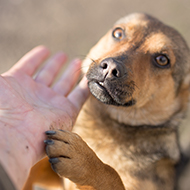Figures reveal Scotland’s hotspots for animals in need

"Our whole team has worked so hard through his unprecedented crisis" - Kirsteen Campbell, SSPCA.
New figures released by the Scottish SPCA (SSPCA) have revealed the hotspots for reports of animals in need during the coronavirus lockdown.
The figures show that the number of calls to the SSPCA's animal helpline fell by eight per cent as a result of the coronavirus pandemic, compared to the first half of 2019. In the first six months of 2020, there were 119,594 to its helpline - a 10 per cent fall in the same period in 2019.
Animal rescue officers responded to 3,226 reports in Fife, making up 10 per cent of all the jobs taken on by the charity. This was closely followed by Glasgow which had 3,113 incidents and then Edinburgh at 2,761.
Like so many animal rescue and rehoming centres across the UK, the lockdown forced the closure of all nine Scottish SPCA centres, meaning that animals were arriving without being rehomed. To help relieve some of this pressure, the SSPCA established an emergency foster scheme which saw more than 260 animals go out on foster, 70 of which were offered a permanent home.
Since May, the SSPCA reports that it has been exceptionally busy, with around 1,000 animals on-site at any given time. Scottish SPCA chief executive, Kirsteen Campbell thanked partners and the public for such great support during the lockdown:
“Our whole team has worked so hard through this unprecedented crisis, and the passion and dedication they have displayed all the way through has been truly inspirational,” she said. “Even during lockdown, we were still averaging a call about an animal in need every 90 seconds, which shows the scale of demand there was for our services.”



 RCVS Knowledge has welcomed Professor Peter Cockcroft as editor-in-chief for Veterinary Evidence.
RCVS Knowledge has welcomed Professor Peter Cockcroft as editor-in-chief for Veterinary Evidence.